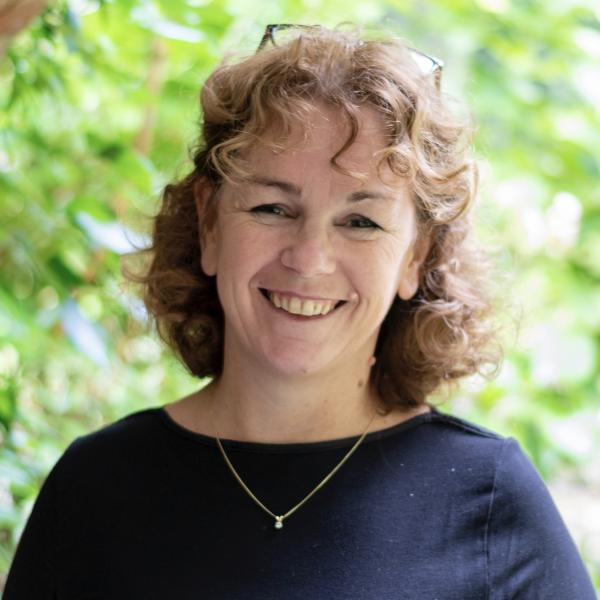Dr Emma Heywood
BA; MA (Manchester); PhD (Manchester)
School of Journalism, Media and Communication
Senior Lecturer in Journalism, Radio and Communication
Director of Postgraduate Taught Programmes (PGT)


+44 114 222 2541
Full contact details
School of Journalism, Media and Communication
C638
The Wave
2 Whitham Road
Sheffield
S10 2AH
- Profile
-
Emma is a Senior Lecturer in Journalism, Radio and Communication and the school's Director of Postgraduate Taught Programmes (PGT). She is a Research Fellow at the Sheffield Institute for International Development, and Senior Fellow of the Higher Education Academy (SFHEA). In 2022, her teaching practice was recognised with a Vice Chancellor's Award for Learning and Teaching from the University of Sheffield.
Her research focuses on the role and impact of radio in conflict- and crisis-affected areas. She has been the principal investigator on two large research projects: a large UKRI-funded project investigating perceptions and representations of women’s rights and empowerment by radio in Mali, Niger and Burkina Faso; and an urgent Covid-19 response project funded by Elrha examining the use of radio and social media to address misinformation about the pandemic among internally displaced persons (IDPs) in Burkina Faso. Both projects build on current work by the FemmePowermentAfrique project, which Emma leads.
Previous projects have been part-funded by the Swedish development agency and the University of Sheffield and have assessed the impact of radio on women's empowerment in Niger and Mali.
Emma has also examined foreign conflict reporting of the Israeli/Palestinian conflict by Russian, French and UK television news providers and also audience perceptions of this reporting. She has previously been awarded British Academy funding for her West Bank project, which investigated the role of local radio in NGO activities in war-affected zones. She has conducted extensive fieldwork in the West Bank and now in west Africa.
- Research interests
-
Emma's research interests lie in the role of radio in fragile and conflict-affected zones, and she works closely with international media development agencies, non-governmental organisations (NGOs) and civil society organisations (CSOs). She is the principal investigator of the FemmePowermentAfrique project, which has conducted large-scale qualitative and quantitative research into the impact of radio on women's empowerment in Niger, Mali and Burkina Faso, and more recently in the Democratic Republic of Congo, in collaboration with Fondation Hirondelle.
She was awarded a large UKRI GCRF grant to analyse radio and women’s empowerment in the Sahel using natural language processing to code the data and social media platforms to gather listener feedback. She has also been awarded a large grant from Elrha to fund an urgent Covid-19 response project examining the use of radio and social media to address misinformation about the pandemic among internally displaced persons (IDPs) in Burkina Faso.
She is currently working on a cross-institutional international project producing ‘information capsule’ podcasts for actors involved in media practice (practical journalism) in conflict-ridden Burkina Faso.
Emma has previously conducted research, funded by the British Academy, into the interaction of radio and NGOs in the occupied Palestinian territories. Her research confirmed the radio's contemporary importance as a mode of broadcasting, demonstrating how it reinforces a sense of local community and provides new communicative possibilities for marginalised social groups.
She has conducted focus groups in the West Bank, Russia, France and the UK to investigate audience perceptions of various aspects of foreign conflict reporting including identity, portrayals of violence, and humanitarianism.
She has published widely in all the above areas and her book Radio and Women’s Empowerment will soon be published by Palgrave.
Drawing on her research experience in impact assessment, Emma has co-edited a book Research Impact and the Early Career Researcher, which documents experiences and perspectives on research impact from a range of disciplines and places them within an analytical and critical discursive framework.
A previous book, European Foreign Conflict Reporting, has contributed to identifying nationally differentiated perceptions of conflict throughout the world and has illustrated the extent to which events occurring in, or associated with, the reporting country affect reporting.
Emma is also the chair of MeCCSA's Radio Studies Network (RSN).
- Publications
-
Books
- Radio and Women's Empowerment in Francophone West Africa. Springer Nature.


- European Foreign Conflict Reporting: A Comparative Analysis of Public News Providers. London: Routledge.


Edited books
- Researching Violent Extremism: Considerations, Reflections, and Perspectives. RESOLVE Network.


- Research Impact and the Early Career Researcher. Routledge.


Journal articles
- Radio and social media as a two-way communication tool in conflict- and pandemic-affected communities in Burkina Faso. African Journalism Studies.


- Reaching hard-to-reach communities: using WhatsApp to give conflict-affected audiences a voice. International Journal of Social Research Methodology.


- The significance of ‘loud’ and ‘quiet’ forms of audience participation to community radio in Niger and Mali. Journal of Alternative & Community Media, 6(2), 179-196.


- Radio as an empowering environment : how does radio broadcasting in Mali represent women’s ‘web of relations’?. Feminist Media Studies. View this article in WRRO


- Evaluating academic and media nongovernmental organization partnerships for participatory data gathering. International Journal of Market Research, 63(1), 43-57. View this article in WRRO


- ‘If you’ve done a good job, it’s as if you’ve never existed’: Translators on translation in development projects in the Sahel. Translation Studies. View this article in WRRO


- Radio Journalism and Women's Empowerment in Niger. Journalism Studies, 21(10), 1344-1362. View this article in WRRO


- The contribution of citizen views to understanding women’s empowerment as a process of change: the case of Niger. Feminist Media Studies, 20(5), 713-729. View this article in WRRO


- Increasing female participation in municipal elections via the use of local radio in conflict-affected settings: the case of the West Bank municipal elections 2017. Journalism. View this article in WRRO


- How Palestinian students invoke the category "human" to challenge negative treatment and media representations. Journal of Community & Applied Social Psychology. View this article in WRRO


- The work of women’s NGOs on commercial radio in the West Bank: Frustrations and shortcomings. Radio Journal:International Studies in Broadcast & Audio Media, 16(1), 59-75. View this article in WRRO


- Comparative Representations of the Middle East: National Values and Russian State-aligned Media. Journal of Contemporary Central and Eastern Europe, 23(2-3), 195-211.


- Comparing Russian, French and UK television news: portrayals of the casualties of war. Russian Journal of Communication, 7(1), 40-52.


- Comparative media: Vremya’s manipulation of foreign conflict reporting in Russia in the context of Western news providers. Slovo, 26(1), 2-17.


- ‘Radio as usual’? Digital technologies and radio in conflict-Affected Burkina Faso. Journalism.


- The ‘Contrôleuse’: Recognising the Role of the ‘Fixer’ in Academic and Media NGO Development Partnerships. Development in Practice. View this article in WRRO


- La radio et le défi de la mobilisation contre la COVID-19 : l’exemple des personnes déplacées internes à Kaya, Pissila et Kongoussi au Burkina Faso. RadioMorphoses.


Chapters
- Introduction, Palgrave Studies in Communication for Social Change (pp. 1-53). Springer International Publishing


- Radio's role in empowering women in conflict-affected areas, The Routledge Companion to Radio and Podcast Studies (pp. 318-326). Routledge


- Reflection, Research Impact and the Early Career Researcher (pp. 155-157). Routledge


- Connecting epistemologies and the early career researcher, Research Impact and the Early Career Researcher (pp. 106-126). Routledge


- Compassion as a News Value: Comparing French and UK Humanitarian Coverage of the War in Gaza 2014 In Anderson, R. & de Silva, P. L. (Ed.), Routledge Companion to Media and Humanitarian Action (pp. 211-220). New York: Routledge.


- Perceptions of Foreign Conflict: Reporting of the War in Gaza in 2014 In hodgson G (Ed.), Conflict, Trauma and the Media : A Collection of Essays Newcastle: Cambridge Scholars.


- Reflection, Research Impact and the Early Career Researcher (pp. 155-157). Taylor & Francis


- Radio and Women's Empowerment in Francophone West Africa. Springer Nature.
- Teaching activities
-
Emma is the departmental Director of Postgraduate Taught Programmes (PGT).
She is a Senior Fellow of the Higher Education Academy (awarded by Advance HE).
Her teaching practice was recognised with a Vice Chancellor's Award for Learning and Teaching in 2022 from the University of Sheffield.
Emma is the module leader for JNL6099 Radio and NGO Communication in Conflict-Affected Areas. She is also a member of the team which teaches the 120-credit level-one JNL120 programme Essential Journalism. She supervises MA and BA dissertations.
PhD Supervision
Emma is interested in supervising doctoral students in the following
areas of research:- Radio, the media and international development / conflict-affected areas
- The role of radio in a changing media context
- Women’s empowerment and international development/conflict-affected areas
Current PhD students
- Maryam Shams: The evolution of media coverage practices in conflicts: France in Chad (1968-2014), an exemplary case study
- PhD supervision
Emma is interested in supervising doctoral students in the following areas of research:
- Radio, the media and international development
- Radio and conflict- and crisis-affected areas
- The interaction between radio and international development agencies, NGOs, and CSOs (particularly regarding women’s empowerment)
- The role of radio in a changing media context
- Women’s empowerment and international development
Current PhD students
- Maryam Shams: The evolution of media coverage practices in conflicts: France in Chad (1968-2014), an exemplary case study
